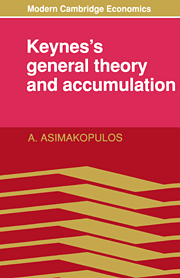Book contents
- Frontmatter
- Contents
- Series preface
- Preface
- 1 Introduction
- 2 Towards The General Theory
- 3 The General Theory of employment
- 4 Consumption and investment
- 5 Money, finance and the rate of interest
- 6 Equilibrium, change and time
- 7 Harrod and dynamic economics
- 8 Robinson on the accumulation of capital
- 9 Conclusion
- References
- Indexes
9 - Conclusion
Published online by Cambridge University Press: 24 October 2009
- Frontmatter
- Contents
- Series preface
- Preface
- 1 Introduction
- 2 Towards The General Theory
- 3 The General Theory of employment
- 4 Consumption and investment
- 5 Money, finance and the rate of interest
- 6 Equilibrium, change and time
- 7 Harrod and dynamic economics
- 8 Robinson on the accumulation of capital
- 9 Conclusion
- References
- Indexes
Summary
Keynes's General Theory provided a theoretical framework for the consideration of the main elements that determine the level of employment in capitalist economies. It was both an affirmation of the importance of economic theory and an indication of its limitations. An affirmation, because this theory shed light on the factors determining the level of employment and pointed to governmental policy measures that could improve an economy's economic performance. An indication of limitations, because the interplay of these factors that led to a particular level of employment was very much dependent on historical and institutional features of the economy. Keynes's General Theory shows that a situation of full employment is not the natural outcome of market forces in economies that are subject to change. Rather, there is a wide range of possible equilibrium situations, with differing degrees of unemployment. The explanation for why one of these possible equilibrium situations attracts actual values depends very much on the particular circumstances of time and place, which determine the values for the ‘given’ factors and the ‘independent’ variables of the General Theory.
The formal model to be found in the General Theory, represented by the set of equations in section 5.5 above, depicts the short-period equilibrium situation corresponding to a particular short interval in historical time. The conditions in that interval depend on decisions and actions taken in the past, and the outcomes are affected by long-term expectations about future conditions that cannot be known.
- Type
- Chapter
- Information
- Keynes's General Theory and Accumulation , pp. 188 - 192Publisher: Cambridge University PressPrint publication year: 1991



